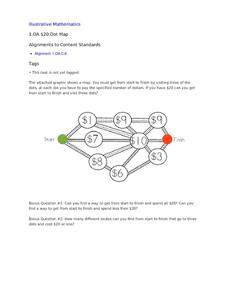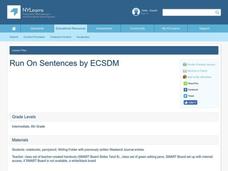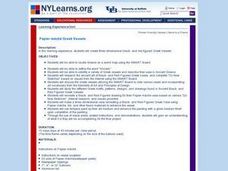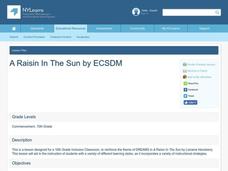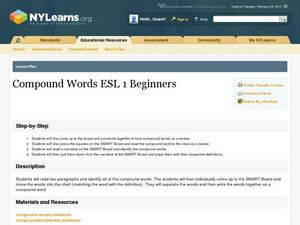Illustrative Mathematics
$20 Dot Map
Challenge the addition skills of young learners with this open-ended math problem. The task is simple, get from start to finish by connecting a series of three numbers. The trick is that the sum of the numbers must be less than...
Curated OER
Talk to Mom, Dad, Sister Worksheets
Help learners with special needs recognize the interests of their family members and build a foundation for conversation practice using worksheet activities and social prompts.
Institute for the Professional Development of Adult Educators
Using Context Clues with Signal Words
When you come across an unfamiliar word in a text, do you skip it and move on? Practice using context clues to identify words you don't know with a thorough set of language arts lessons. The resource reinforces close reading and critical...
National Wildlife Federation
An Energy Mix: Renewable and Nonrenewable Resources
What did the windmill say about renewable energy? I'm a BIG fan! Lesson three in the series of 12 has classes discuss potential and kinetic energy and then, in pairs, they complete a web quest over the different types of energy...
National Woman's History Museum
Getting with the Program
A seven-step lesson introduces the emergence of computer sciences and the contributions women made to the profession after World War II. Several science experiments offer pupils a hands-on learning experience that showcases parabolas,...
Curated OER
Literary Elements in Of Mice and Men
Ninth graders review an exercise, after reading most of the novel Of Mice and Men by John Steinbeck. They demonstrate a range of literary elements such as conflict, symbolism, setting, and foreshadowing. Students also are able to provide...
Curated OER
Writing Example Paragraphs
Sixth graders write example paragraphs. The term "example paragraph" refers to a paragraph where the supporting sentences provide examples of the subject/idea described in the topic sentence. Students write a basic example paragraph...
Curated OER
How Cells Reproduce
Learners explain why cells reproduce and draw a diagram of each of the stages in mitosis. They put the stages of mitosis (interphase, prophase, metaphase, anaphase, telophase, and cytokinesis) in the correct sequence, from the beginning...
Curated OER
Taxes and Social Security
Students practice filling out the United States Federal 1040EZ tax form and share examples in a class discussion. A written exam is provided to help assess cumulative comprehension.
Curated OER
Combining Syllables to Form 2- and 3-Syllable Words
Students practice combining consonant-vowel-consonant sounds to form words. They read closed and silent "e" syllables. Students construct two-syllable words. They arrange syllables to form three and four syllable words.
Curated OER
The Parts of a Newspaper
Tenth graders examine the parts of a newspaper. They observe a PowerPoint presentation. Students participate in a research project to recognize the different types of materials each newspaper section contains. They read, summarize, and...
NY Learns
Taxes and Social Security
In an effort to help prepare teens for the realities of taxes, the teacher fills out a sample 1040EZ while it's projected for the class to see. This is part of a unit on taxes and social security that culminates in a 50+ question test...
Curated OER
Run On Sentences
Sixth graders review three sample sentences in order to identify sentence structure, and to practice how to edit sentences appropriately. They work with a partner to define a run-on sentence and identify three ways to correct it. They...
Curated OER
Angle Pairs
Eighth graders are introduced to the vocabulary associated with angles. They experiment with vertical angles, alternate interior angles, alternate exterior angles, and corresponding angles. They determine angle pair relationships when...
Curated OER
Do You Know Your Schedule?
Students identify classes in their schedules and associate the class with the time of day it is held. They then name classes in sequential order according to the period during which it occurs.
Curated OER
The Triple Beam Balance
Students explore mass measurement. They complete a diagram of a triple beam balance. Students explore using the triple beam balance to determine the mass of an object. They discuss procedures for using the triple beam balance.
Curated OER
Learning to Fight Peer Pressure
Students discuss what peer pressure means to them and give examples of peer pressure. They discover what assertiveness means and how to distinguish it from aggressiveness.
Curated OER
Compass Rose for the New Millennium
Sixth graders are introduced to the concepts of a compass rose and how it used in relationship to reading maps in geography. The lesson is meant to build upon prior knowledge and skills.
Curated OER
Papier-mache Greek Vessels
Sixth graders create three-dimensional black and red figured Greek Vessels out of papier-mache, while researching and discussing Greek history, and myths of powerful gods and goddesses.
Curated OER
What is Culture?
Sixth graders study ancient cultures of the world. They describe the meaning of culture. Students distinguish between the material and non-material aspects of culture. They create a collage identifying the material and non-material...
Curated OER
A Raisin In The Sun
Tenth graders complete a brief journal entry explaining what they would do with one million dollars. They read and discuss "Dream Deferred" by Langston Hughes. Students finish reading Act I of A Raisin In The Sun and identify the...
Curated OER
Take Me to Sesame Street!
Students will apply concepts learned in genetics, such as Punnett squares and pedigree charts, in creating their own monster family. Also they will work cooperatively with a partner to create their monster family.
Curated OER
Compound Words ESL 1 Beginners
Bring vocabulary to life with this SMARTboard activity! With a list of (linked) compound words, learners combine each part of the word to complete the compound word. They then read a narrative and identify the compound words. The last...
Curated OER
The Industrial Revolution
Tenth graders analyze the impact (costs/benefits) of the Industrial Revolution on various groups of people in society (gender, children, socio-economic class, etc.). They then evaluate the impact of industrialization on the environment.
Other popular searches
- Smart Board Lessons
- Smart Board Reading
- Smart Board Math
- Smart Board Activities
- Our Community Smart Board
- Ecology Smart Board
- Smart Board Library Skills
- Smart Board Using Commas
- Smart Board Lessons Algebra
- Smart Board Lessons Antonym
- Smart Board Math Probability
- Smart Board Literary Terms
